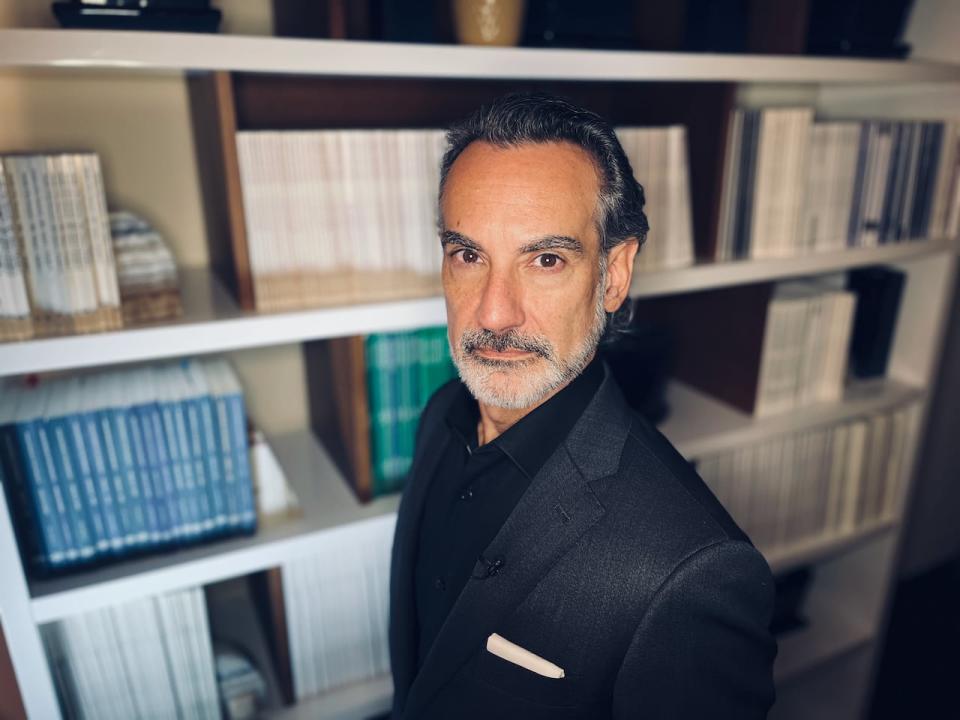Lawyer says contentious psychologist will 'dispel the myth' that B.C. nurse's comments harm trans people

The legal team for a B.C. nurse facing potential discipline over her public statements about transgender people is arguing that a controversial psychologist should be allowed to give expert evidence suggesting there is social value and scientific truth in her opinions.
Amy Hamm's lawyer argued Wednesday that Toronto psychologist James Cantor's evidence is necessary to counter the B.C. College of Nurses and Midwives' contention that Hamm has committed unprofessional conduct.
"He can dispel the myth that Amy Hamm's opinions … will lead to actual harm to transgender people or deter them from seeking medical care," lawyer Karen Bastow said Wednesday during a hearing on whether Cantor should be qualified as an expert witness.
A citation from the college alleges Hamm has "made discriminatory and derogatory statements regarding transgender people" while identifying herself as a nurse. Hamm frequently refers to transgender women as "men" in social media posts, videos and podcasts, implying they pose a danger to cisgender women and children, and has referred to the disciplinary proceedings as a "witch trial."
Bastow told a college discipline panel that Hamm makes these statements in the interest of protecting "historically marginalized groups" and preventing the "mutilation of children" through gender-affirming care. She argued that Cantor's evidence will prove her opinions are valuable and supported by science.
The college, on the other hand, is arguing to disqualify Cantor as an expert, arguing he doesn't have the necessary expertise.
Cantor's research to date has largely focused on pedophilia and what he calls atypical sexualities. However, he has recently made about two dozen appearances in U.S. courtrooms to testify in support of state laws that restrict medical care, bathroom use and participation in sports for transgender people.
Psychologist says he's 'appearing at a financial loss'
During cross-examination on Wednesday, Cantor confirmed that he has doubled his income this year by appearing as an expert in the U.S., and has had to take a sabbatical from clinical practice because he is so busy in court.
Cantor noted, however, that he is making "far, far less" for his appearances in Hamm's case.
"I'm appearing at a financial loss," he said.
In his testimony in the U.S., Cantor has questioned the safety and effectiveness of gender-affirming care and suggested that many teens who identify as trans are really just insecure about fitting in and growing up.
Under questioning at Hamm's hearing, Cantor suggested that many young people who identify as transgender will actually turn out to be gay or lesbian, and that growing numbers of adolescents are coming out as trans because of social media.
However, Cantor has also acknowledged that he has never treated anyone under the age of 16 for gender dysphoria.

Since 2021, Toronto psychologist James Cantor has testified in more than 20 cases in the U.S. involving transgender issues. (Craig Chivers/CBC)
Earlier in the week, Cantor responded to a question of whether transgender people face discrimination and exclusion because of their gender identities by suggesting they may not understand the true source of the prejudice they experience.
"They may perceive that they were the victim of transphobia when they were actually the victim of homophobia," he said on Tuesday.
In arguing against qualifying Cantor as a witness, college lawyer barbara findlay, who spells her name without capital letters, told the panel that it is bound to follow precedent laid down by Canadian courts. That precedent — along with the Criminal Code of Canada, the Canadian Human Rights Act and the B.C. Human Rights Code — holds that transgender people are a particularly vulnerable group deserving of protection from discrimination.
To support her case, findlay read from the Supreme Court of Canada's recent decision to dismiss a defamation suit brought by a former Chilliwack school board trustee over comments describing his public statements as bigoted, transphobic and hateful.
"Courts and tribunals have recognized that transgender people remain among the most marginalized in Canadian society, and continue to live their lives facing disadvantage, prejudice, stereotyping, and vulnerability," Justice Andromache Karakatsanis wrote in the majority opinion on Hansman v. Neufeld.
The disciplinary panel has yet to rule on whether Cantor should be qualified as a witness in Hamm's case. The hearing is set to resume on Oct. 31.


